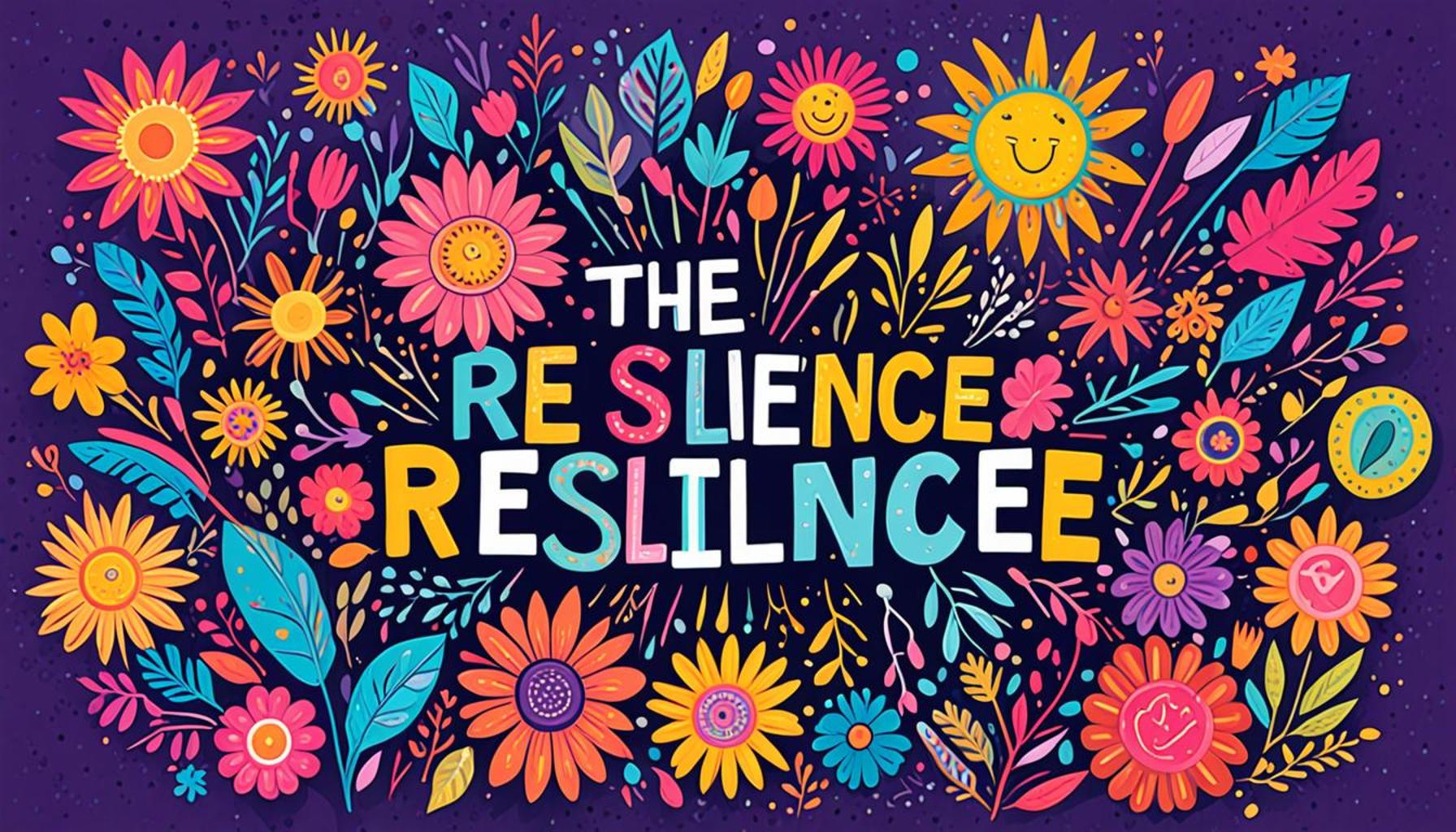Positive Affirmations to Overcome Challenges: Strengthening Resilience in Difficult Times

Understanding Resilience Through Positive Affirmations
Today’s society presents a myriad of challenges that can often leave individuals feeling overwhelmed. From fluctuating economic conditions to intricate societal issues, it is crucial to develop a strong sense of resilience. One highly effective strategy to build this strength is through the use of positive affirmations. These affirmations are more than mere phrases; they are powerful tools that can reshape our thoughts and beliefs, leading to enhanced emotional well-being.
The Transformative Power of Positive Affirmations
Incorporating positive affirmations into daily life comes with a host of benefits that can act as a buffer against life’s stresses. For instance, regularly affirming one’s self-worth can lead to a significant boost in self-esteem. This uplift in confidence is particularly vital in environments where societal expectations can be pressure-laden. Moreover, these affirmations can enhance focus on personal growth, enabling individuals to pursue their aspirations, whether they relate to career advancement or personal relationships.
In Nigeria, the daily hurdles may be complex, ranging from economic uncertainties to societal pressures, making the need for resilience even more pressing. In this context, positive affirmations can serve as a refuge. For example, an aspiring entrepreneur may face various challenges in accessing capital or navigating market demands. Using affirmations such as, “I am capable of overcoming any challenge,” can empower them to persist despite these obstacles.
Crafting Your Personal Affirmations
Implementing positive affirmations can be simple yet profoundly impactful. Statements like, “Every setback is a setup for a comeback” or “I have the strength to face my fears” can be integrated into daily routines, such as during morning rituals or before significant events. These affirmations can be written down and displayed in prominent places, like on a mirror or the refrigerator, serving as continuous reminders of one’s potential.
- “I am worthy of success and happiness.”
- “My challenges are stepping stones to my growth.”
- “I have the resilience to turn my dreams into reality.”
By adopting such affirmations, individuals in Nigeria—and indeed anywhere—can cultivate a mindset that embraces change and nurtures hope. In a world that may at times feel bleak, the power of conscious, positive language offers a transformative pathway to mental fortitude. Embracing positive affirmations equips individuals with the necessary tools to not only cope with challenges but to thrive amidst them, standing tall in the face of adversity.

YOU MAY ALSO LIKE: Read read another article
Implementing Positive Affirmations in Daily Life
To harness the full potential of positive affirmations, individuals must commit to integrating them into their daily routines. This initiative transcends mere repetition; it is about genuinely believing in the affirmations one utters. The process begins with identifying personal challenges—whether they are related to work, relationships, or even mental health. Once these challenges are recognized, individuals can craft affirmations that directly address their concerns, turning uncertainty into a source of strength.
Creating Impactful Affirmations that Resonate
For effectiveness, affirmations should be concise, relatable, and, most importantly, personal. Engaging in a reflective practice allows individuals to connect their affirmations to their lived experiences. For example, someone struggling with job security may find solace in the affirmation, “I am adaptable and can seize new opportunities.” This declaration not only strengthens one’s resolve but also fosters an unwavering belief in one’s own capabilities.
In a world where external opinions often influence self-perception, crafting affirmations is also about reclaiming one’s narrative. For instance, a student facing academic pressure might benefit from affirmations like, “I am dedicated to my studies and capable of success.” These statements serve as a mental safety net, encouraging a positive mindset even when faced with examination defeats or peer comparisons.
Tips for Effective Affirmation Practice
For affirmations to be effective, consistency is key. Below are some practical tips that individuals can employ to maximize the impact of their positive affirmations:
- Consistency: Recite your affirmations daily, ideally during moments of calm, such as morning meditation or evening reflections.
- Emotional Connection: Visualize your affirmations in action; feel the emotions associated with achieving your dreams.
- Positive Language: Use affirmative, present tense language. Instead of saying, “I will be successful,” say, “I am successful.”
- Repetition: Repeating affirmations throughout the day can reinforce the messages, helping to establish new neural pathways in the brain.
In Nigerian culture, where many individuals face a multitude of challenges daily, the collective wisdom surrounding the use of positive affirmations could pave the way for increased psychological resilience. As more people share their experiences and affirmations, a supportive community is fostered, promoting collective healing and empowerment.
Ultimately, the practice of utilizing positive affirmations in the face of adversity is not merely about easing discomfort—it is about transforming one’s outlook on life and embracing the possibility of growth. This practice nurtures resilience, allowing individuals not only to withstand challenges but also to emerge from them renewed and empowered.
Continuing our exploration of the powerful role of positive affirmations, it’s crucial to dive into how these simple yet profound statements can significantly influence our mindset and resilience during challenging times. Many individuals find themselves overwhelmed by adversities, but by incorporating affirmative language into their daily routines, they can cultivate a more resilient perspective.
One primary aspect of utilizing positive affirmations is their ability to rewire negative thought patterns. Research has shown that regularly affirming one’s strengths and goals can lead to significant shifts in mentality. This process is not just a fleeting moment of positivity; it actively fosters resilience. When individuals affirm statements such as, “I am capable of overcoming any challenges that come my way,” they reinforce their sense of self-efficacy, thereby enhancing their ability to cope with stressors.
Moreover, using positive affirmations promotes emotional stability. In turbulent times, reminding oneself that “difficulties are opportunities for growth” encourages a proactive approach to problems. This shift in perspective can serve as a motivation booster, pushing individuals to seek solutions rather than wallowing in despair. As individuals circulate these affirmations, they provide a continual source of encouragement, ultimately leading to a stronger, more resilient character.
Incorporating daily practices such as journaling or vocalizing affirmations can further deepen their impact. Set times for reflection, perhaps in the morning to kickstart the day, or during moments of stress, to reaffirm your strength and resilience. Such habitual practices create an internal dialogue that consistently nurtures a positive mindset, enabling individuals to face life’s challenges with greater confidence.
To amplify the effects of positive affirmations, consider complementing them with mindfulness exercises. Practices such as meditation or deep breathing can enhance mental clarity and reinforce the affirmations being used. When combined, these techniques not only strengthen resilience but also enrich one’s emotional well-being during difficult times.
As we explore the breadth of resilience, it becomes evident that positive affirmations are a vital tool in fostering a profound and lasting change in how we perceive and approach our challenges. By embracing this simple yet effective practice, individuals can enhance their emotional and psychological fortitude, becoming better equipped to navigate life’s inevitable challenges.
YOU MAY ALSO LIKE: Read read another article
Overcoming Common Challenges with Affirmations
Challenges are an inherent part of the human experience, and in Nigeria, where individuals endure unique societal pressures, the practice of positive affirmations can be transformative. Addressing common struggles—from unemployment to societal expectations—using tailored affirmations can serve as a powerful strategy for resilience. By articulating positively framed statements, individuals not only affirm their capabilities but also create an inner dialogue that combats negativity.
Affirmations for Personal and Professional Growth
Many Nigerians face obstacles related to career advancement, often feeling overshadowed by competition. An affirmation like, “I am deserving of the opportunities that come my way, and I embrace them fully,” can serve as a motivational push during job searches or interviews. Such statements enable individuals to step into their power, reminding them of their worth and potential.
In education, where students frequently grapple with peer pressure and high expectations, an affirmation such as, “I am capable of achieving my academic goals at my own pace,” can foster self-acceptance and encourage perseverance. By recognizing their unique learning journeys, students can alleviate the anxiety tied to comparisons, and focus on their personal growth.
Building Resilience through Community Support
In Nigeria, community plays a pivotal role in overcoming difficulties. Utilizing positive affirmations within social circles can promote collective resilience. When friends or family members come together and share affirmations collectively, the impact can be profound. A group affirmation such as, “We support each other through challenges and celebrate our successes,” creates a safe space that fosters empowerment and a sense of belonging.
Additionally, harnessing online platforms to share affirmations can help build a supportive network. Social media groups dedicated to mental wellness or career advancements can encourage members to post their affirmations regularly, thereby reinforcing positive self-beliefs and resilience through shared experiences.
The Science Behind Positive Affirmations
Scientific research emphasizes the efficacy of positive affirmations in neurological rewiring. When individuals repeat affirmations, they activate the brain’s reward center, fostering a heightened sense of self-worth. Studies show that consistent practice can lead to decreased stress levels and increased performance in areas like public speaking, a common fear among many. For instance, before a presentation, repeating affirmations like, “I speak confidently and with clarity,” can ease the nerves, resulting in better outcomes.
Incorporating mindfulness into affirmation routines further enhances their effectiveness. By pairing deep breathing exercises with affirmations, individuals can enter a more relaxed state, allowing the affirmations to resonate on a deeper level. This incorporation not only promotes mental clarity but also prepares individuals to tackle challenges head-on.
Practical Steps for Sustaining Affirmation Practice
- Journaling: Keep a dedicated affirmation journal to track feelings and progress, reinforcing the impact of your positive statements over time.
- Visual Cues: Place your affirmations in visible areas—like mirrors or workspaces—to remind yourself of these empowering messages throughout the day.
- Incorporate Affirmations into Rituals: Integrate affirmations into meaningful daily rituals, such as cooking or exercising, to make them a regular part of your life.
Integrating positive affirmations into daily life is not a mere practice but a path towards redefining self-belief and resilience. As individuals across Nigeria embrace this proactive approach, they collectively lay the groundwork for a culture steeped in empowerment and support, reminding everyone that challenges, while daunting, can indeed be overcome.
SEE ALSO: Click here to read another article
Conclusion
In the face of adversity, the practice of positive affirmations emerges as a beacon of hope and resilience for individuals navigating challenges in Nigeria. As we have explored, affirmations tailored to personal or societal struggles not only bolster self-confidence but also promote a supportive community ethos that is crucial for overcoming difficulties. By instilling a culture where individuals express their affirmations together, we foster an empowered community that reinforces the belief that challenges can be surmounted collectively.
The science behind the efficacy of these affirmations points to a profound neurological impact, showing how positive self-talk can rewire our thought patterns and alleviate stress. With practical steps like journaling and incorporating affirmations into daily rituals, individuals can create a sustainable practice that nurtures resilience over time. This proactive approach enables one to face obstacles with a renewed sense of purpose, inching towards personal and professional growth amidst uncertainty.
As the world continually evolves with new challenges, embracing positive affirmations stands as a profound tool within reach of every Nigerian. This practice not only empowers individuals to navigate their unique circumstances but also allows them to share their journeys and triumphs, cultivating a ripple effect of resilience. Together, by harnessing this transformative power, we can build a more supportive environment that celebrates perseverance, fosters courage, and ultimately transforms challenges into opportunities for growth.


